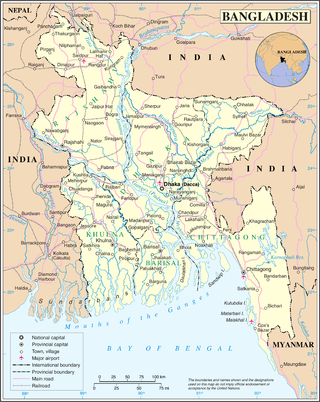
Since Bangladesh's independence in 1971, the transportation sector has grown rapidly and transportation medium on land and rivers have begun to develop. Air travel came into existence later. Though Bangladesh has greatly evolved in the transportation sector, it still has many flaws which hamper the development of other economic and social sectors. Transportation has evolved in mostly land vehicles but it still needs improvement in safety standards, which endangers the life of civilians.
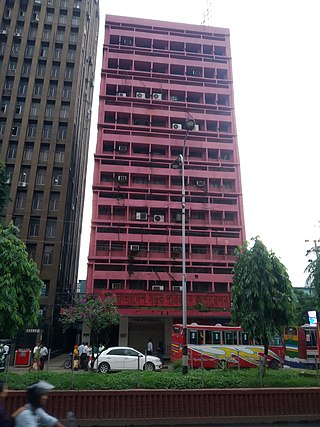
Bangladesh Road Transport Corporation (BRTC) is a state-owned transport corporation of Bangladesh. It was established under the Government Ordinance No.7 of 1961 dated 4 February 1961. Following the independence of Bangladesh in 1971, it assumed its current name. It is responsible for issuing buses and maintaining the public transports in the roads and highway division.
The MRT Brown Line is a 22.1 km rapid transit line in Bangkok, Thailand proposed monorail mass transit line from Nonthaburi Civic Centre, Nonthaburi Province to Lam Sali intersection, Bang Kapi District. 20 stations are proposed for the line and the expected cost for the project is 48 billion baht. The line has been integrated for 7.2 km with the N2 expressway project and a feasibility study has been completed. The MRT Brown line will interchange with 7 other mass transit lines.

The transportation system in Metro Manila covers the road network, rail network, ferries, ports and airports located with the metropolitan Manila area. Road transportation in Metro Manila is diverse, composed of many types of private and public transport vehicles. These include Taxis, buses, jeepneys, tricycles and pedicabs. In some areas, especially in Divisoria and large public markets, two-stroke motors are fitted in the pedicabs and are used for goods transport. Regardless of modernity, horse-drawn kalesas are still used in the streets of Binondo and Intramuros. Ridesharing services such as Grab also operate within in Metro Manila.
The BMA Grey Line is a planned monorail line in the north of Bangkok to be built from Watcharaphon to Thong Lo. The route would provide a vital north - south link for a distance of 16.25 km with 15 planned stations and is expected to cost 27 billion baht. The line would support the growth of residential areas around Pradit Monutham Rd and Kaset-Namawin rd corridors and is forecast to eventually have 370,000 passengers per day. The BMA Grey with interchange with other lines including the MRT Pink Line, the proposed MRT Brown Line, the MRT Yellow Line, MRT Orange Line and BTS Sukhumvit Line.
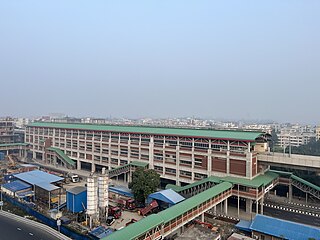
The Dhaka Metro Rail, or simply the Dhaka Metro, is a mass rapid transit system serving Dhaka, the capital and largest city of Bangladesh. It is owned and operated by the Dhaka Mass Transit Company Limited (DMTCL). Together with the under construction Dhaka BRT, proposed Dhaka Subway and Dhaka suburban circular rail, it is expected to reduce traffic congestion in the city. The metro rail network has five planned lines which are the MRT Line 6, the only operational line, MRT Line 1 and 5, which are under construction, and MRT Line 2 and MRT Line 4, which are in the planning stages. It is part of the Strategic Transport Plan outlined by the Dhaka Transport Coordination Authority (DTCA).

Dar es Salaam Rapid Transit also known as UDART is a bus rapid transit system that began operations on 10 May 2016 in Dar es Salaam, Tanzania.
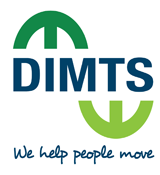
Delhi Integrated Multi-Modal Transit System (DIMTS) Limited is a transport consultancy and infrastructure development company. It is a joint venture company with equal equity of the Government of National Capital Territory of Delhi (GNCTD) and the IDFC Foundation.
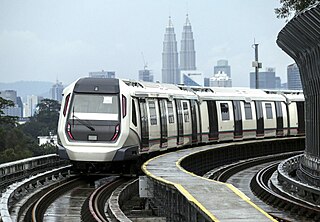
The Klang Valley Integrated Transit System is an integrated transport network that primarily serves the area of Klang Valley and Greater Kuala Lumpur. The system commenced operations in August 1995 with the introduction of commuter rail service on the existing rail between Kuala Lumpur and Rawang. The system have since expanded and currently consists of 11 fully operating rail lines in a radial formation; two commuter rail lines, six rapid transit lines, one bus rapid transit line and two airport rail links to the Kuala Lumpur International Airport's (KLIA) Terminal 1 and Terminal 2, and one temperarily suspended airport rail link to the Sultan Abdul Aziz Shah Airport. The system encompasses 528.4 kilometres (328.3 mi) of grade-separated route on standard gauge and metre gauge with 176 operational stations.
The Lagos Metropolitan Area Transport Authority (LAMATA) is the Lagos State Government agency created to coordinate transport planning, policies, and public transport infrastructure implementation in the Lagos Metropolitan Area, Nigeria. The organisation oversees wide range of transport planning and implementation of transport strategies and plans in Lagos, as well as the Lagos Rail Mass Transit and the Lagos Bus Rapid Transit System. It is based in Ikeja.

Bangladesh Bridge Authority (BBA) is a statutory government body responsible for the construction and maintenance of bridges, tunnels, flyovers, overpasses, causeways and subways in Bangladesh. It is headquartered at Dhaka, Bangladesh. The authority operates under the purview of the Bridges Division within the Ministry of Road Transport and Bridges.
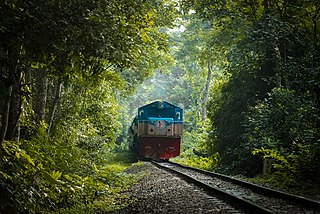
Dhaka Subway is an underground urban rail network being planned in Dhaka, the capital city of Bangladesh, by the Bangladesh Bridge Authority. Dhaka Subway was conceived as a separate transport system to the Dhaka Mass Rapid Transit network, commonly known as Dhaka Metro Rail.

Purbachal Expressway, officially the Sheikh Hasina Avenue, is a 12.5-kilometre-long (7.8 mi), 14 lane expressway in Dhaka, Bangladesh. This expressway connects Purbachal to eastern Dhaka.

The MRT Line 6 is a line on the Dhaka Metro Rail. It is Bangladesh's first rapid transit line and has been in service since 2022. It is an entirely elevated line and currently has 16 stations in service between Uttara North and Motijheel.

The Rapid Pass is a smart card automated fare collection system based on near-field communication (NFC) technology used on participating public transit systems in Dhaka, the capital of Bangladesh. Rapid Pass card readers were implemented on a trial basis in 2017. Full implementation began in January 2018 and it was rolled out across rapid transit stations, railway stations, bus stops and terminals, and transit vehicles on many different transit systems.
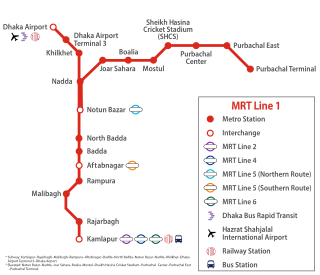
The MRT Line 1 is Dhaka's rapid transit line under construction. It will be the second of the Dhaka Metro Rail system and will be operated by Dhaka Mass Transit Company Limited (DMTCL). Its construction started in February 2023. It is scheduled to open in December 2026.

The Dhaka BRT or Dhaka Line is a bus rapid transit system in Dhaka, Bangladesh. The network was originally planned to contain two lines which are BRT Line 3 and BRT Line 7. Of the two sections that were originally planned for BRT Line 3, only the northern section of the line is under construction from 2017, with the other route being in the planning phase.

The Northern Route is one of the branches of the approved MRT Line 5 of Dhaka Metro Rail; the other one being the Southern Route. The construction of the Northern Route started in 4 November 2023 and is scheduled to commence operation by 2028.
The Dhaka–Narayanganj AC Bus is a inter-city bus service connecting Dhaka and Narayanganj. The service is operated by the Bangladesh Road Transport Corporation (BRTC) and was launched in 2011.















